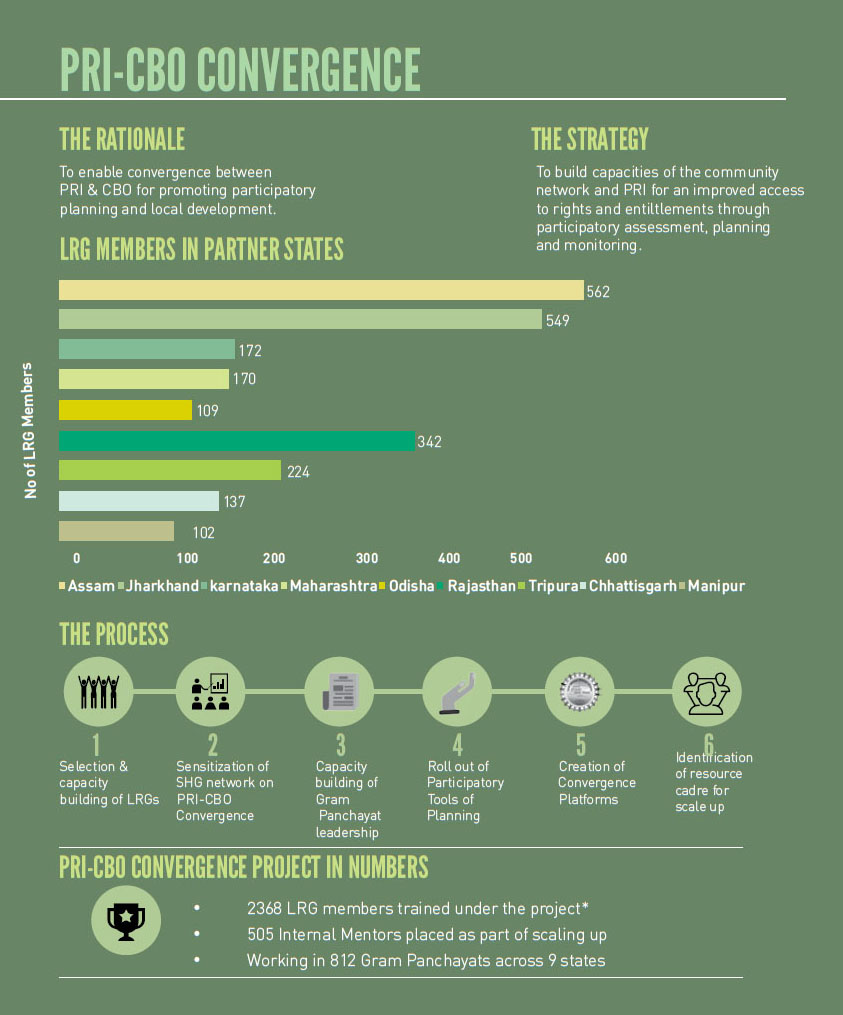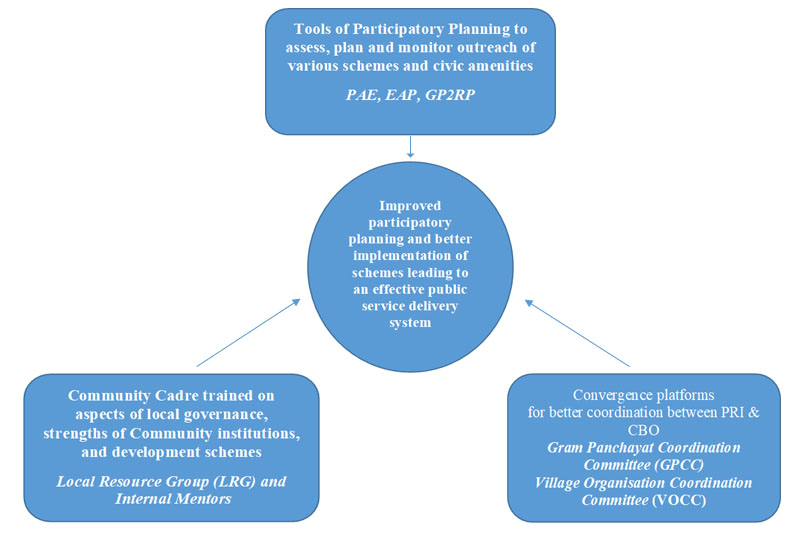States / Programmes / PRI-CBO Convergence

PRI-CBO Convergence (3)
PROJECT CONTEXT
The PRI-CBO convergence project envisages a mutually beneficial relationship between the Panchayati Raj Institutions and the communities in the process of implementing poverty eradication programmes. Panchayati Raj institutions came to existence in 1993 through the 73rd constitutional amendment with a mandate of addressing rural poverty and ensuring social justice. The SHG network that has emerged alongside has been a huge social capital for the Gram Panchayat to work with for addressing poverty and ensuring social justice. Recognising the need for an effective functional relationship between PRIs, especially Gram Panchayats and the SHGs of women, in particular the Village Organisations (VO), the Ministry of Rural Development (MoRD) had amended the NRLM framework to incorporate provisions for bringing about a formal relationship between the institutions of local government and the organisations of the poor. Kudumbashree NRO with the experience of converging PanchayatiRaj Institutions with the SHG network has been mandated to support states interested inimplementing the model. The PRI-CBO Convergence project is based on this premise that a synergy between both these institutions can be mutually beneficial in addressing the issue of poverty for the larger goal of socio-economic development of the village. Developing an entitlements-based perspectives for women’s collectives is central to the strategy.
A comprehensive convergent action plan which is a mix of accessing entitlements and schemes in the domain of health, education, women and child development, agriculture, animal husbandry, creation of wage employment, creation of community assets, accessing credit for livelihoods and other needs, creation of water resources etc. are taken up. The implementation of these plans are often done in convergence with other CSS/SSS. Special efforts are also taken to include the action plans with the Gram Panchayat Development Plan.
Scope of the PRI-CBO convergence project includes the following
• Capacity building of Panchayati Raj Institutions (PRI) and Community Based Organisations (CBO)
• Creation of a community cadre (Local Resource Group) in every Panchayat
• Strengthening CBOs to engage PRIs for addressing the special needs of the poor and the marginalised
• Converging the implementation of MGNREGS and other centrally/state supported schemes for strengthening the PRI-CBO interface
• Improvement in the governance process through effective participation in Gram Sabhas
• Participatory assessment of entitlement exercise by the SHGs
• Preparing poverty reduction action plan for the Panchayats
• Creation and institutionalisation of Convergence Committees at the CBO and with the panchayats

The strategy is to increase the capability of women from the community network to demand entitlements and engage with the Panchayati Raj Institutions for better participatory planning. Such an enhanced participation of the community in local planning and monitoring of entitlements ensures an active involvement of the Panchayat thereby leading to better implementation of schemes and improved service delivery. To strengthen the process, a group of motivated individuals from the community, known as Local Resource Group (LRG) are selected and trained in aspects of local governance and development schemes for providing the anchor role in the PRI- CBO convergence process. The sustainability of this process is ensured by establishing institutional platforms with representatives from the community institutions and gram panchayat to promote effective dialogue between the two grassroot agencies. Experienced CDS Chairpersons from Kerala are sent as mentors to the states to work with the community.
For implementing the model, Kudumbashree NRO has evolved a set of tools for participatory assessment and planning by engaging SHGs with the constitutionally mandated local governance system (Panchayati Raj institutions). These tools, which are process oriented in nature, help in developing a strong community cadre and building capacities of local institutions for improving the reach and quality of public service delivery. The tools which are called Participatory Assessment of Entitlement (PAE), Entitlement Access Plan (EAP), Gram Panchayat Poverty Reduction Plan (GP2RP) and Village Poverty Reduction Plan (VPRP) are used by the SHG households for understanding and documenting gaps in entitlement access, planning for its access entitlements and undertaking joint consultative activities with Gram Panchayats (GP) for eradicating poverty at the village level. These tools help in generating a collective energy and a conducive atmosphere for the PRI and CBO to work together for village development. At the same time the entire process capacitates the local institutions to meet the development needs of the village.
Outcome of the participatory planning exercises
At the end of the above participatory planning exercises, GP2RP which is the comprehensive demand plan prepared by the community network is submitted to the Gram Panchayat. The plan is discussed during Gram Sabha and necessary components are then added to the Gram Panchayat Development Plan (GPDP). To strengthen and institutionalize the interaction between Panchayati Raj Institutions and Community Based Organizations, Kudumbashree NRO forms Gram Panchayat Coordination Committee (GPCC), an institutional platform set up at the Gram Panchayat level for better coordination between PRI and CBO in matters related to planning and service delivery.
KEY COMPONENTS UNDER CONVERGENCE PROJECT


BACKGROUND
The PRI-CBO Convergence approach is based on the premise that if institutions of the poor such as Community Based Organisations (CBO) and constitutionally mandated body like Panchayati Raj Institutions (PRI) collaborate with each other to work for the development of the village, they can significantly enhance the livelihood and social security of the vulnerable and poor. The PRI-CBO Convergence project builds capacities of PRI and SHG network to work together to strengthen the poor’s access to entitlements and enhance the public’s participation in local governance for improved service delivery. To achieve this, a cadre of motivated community individuals called Local Resource Group (LRG) are nurtured in partner States. The LRGs are expected to work towards enabling convergence of PRI and CBO for the development of the village. As part of the project strategy, the CBOs and PRI are introduced to participatory assessment, planning and monitoring tools to help local communities build awareness and plan for their access to schemes and benefits.
PROFILE
The PRI-CBO convergence project has been implemented in twelve states till now across India and includes states like Assam, Jharkhand, Rajasthan, Karnataka, Maharashtra, Odisha, Chhattisgarh, Manipur, Uttar Pradesh, and Tripura. Arunachal Pradesh and Meghalaya are the latest addition to the states where the PRI-CBO convergence project has established its presence. At present, the project is functioning only in states like Assam, Meghalaya, Arunachal Pradesh, Manipur, Mizoram and Uttar Pradesh.
| PROJECT FOOTPRINT | |
| No. of partner states | 13 |
| No. of Districts | 61 |
| No. of Blocks | 105 |
| No. of Gram Panchayats | 950 |
| No. of Mentors | 60 |